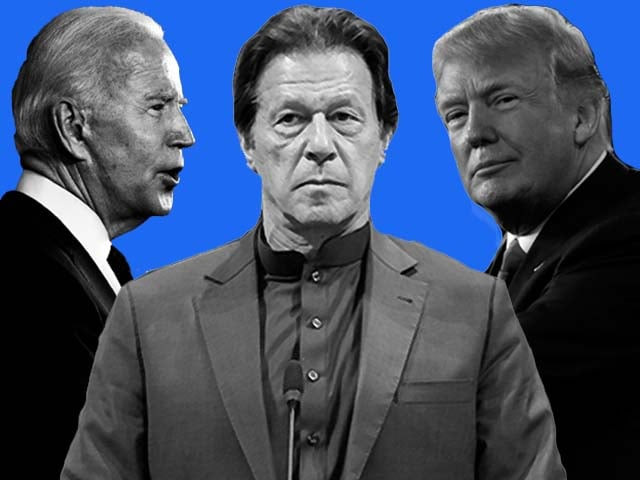A change in the White House is often followed by a foreign policy shift in Islamabad. Every United States (US) president, as in the words of Noam Chomsky, comes with a new doctrine that significantly impacts global geopolitics. Thus, it will be unsurprising to see that if Joe Biden gets elected, Pakistan’s relations with the US and its allies might change for good. To understand how the outcome of the US presidential elections in November can pave the way for a change in US-Pak relations and Pakistan’s relationship with its South Asian neighbours, it is imperative to historically analyse Biden and President Donald Trump’s positions towards Pakistan.
The election of Donald Trump did not particularly bode well for the US-Pak relationship. His espousal of the “no more” mantra and announcement for a reduction in bilateral aid to Pakistan in a New Year tweet in 2018 remarkably strained the diplomatic relationship between the two cold war allies. However, Prime Minister Imran Khan’s visit to Washington in July last year brought a breath of fresh air to Islamabad, and the bilateral relations between the two countries improved. Soon after, the Trump administration also resumed Pakistan’s participation in US military training and educational programmes after a year when it was abruptly halted by the US president.
Moreover, realising the strategic importance of Pakistan and its role in Afghanistan during the cold war period, Washington toned down its harsh criticism aimed at Islamabad for playing a “double-game” in the region – selectively targeting militant and anti-US elements on strategic grounds. This also gave Pakistan the diplomatic space to resume its role as a strategic mediator between the US and the Taliban leadership in Afghanistan for a long term peace accord and regional stability. Trump’s disinterest in continuing the Afghan saga, and his commitment to a withdrawal of American forces from Afghanistan before his tenure ends, further provided space for Pakistan to play an active role in its regional politics.
However, if Biden gets elected in the upcoming US elections, things might not start in the same manner. Unlike Trump’s scepticism about Pakistan’s role in the US war on terror, Biden has historically looked upon Pakistan as a strategic regional ally. During his tenure as the Chairman of the Senate Foreign Relations Committee (SFRC), Biden, along with Senator Richard Lugar, promulgated the Enhanced Partnership Act with Pakistan 2008. Their efforts to strengthen the US-Pakistan relationship later culminated in the famous Kerry-Lugar-Berman Act 2009 after Senator Kerry became the Chairman of SFRC. The main aim of Biden’s effort was to improve the political and economic situation in Pakistan for regional stability.
Likewise, Biden also sees Pakistan as a valuable and trustful ally in the context of the Afghan problem. Shuja Nawaz, in his recent book The Battle for Pakistan, recalls that during his visit to Kabul as the vice president of the US, Biden gave a ‘shut-up call’ to Hamid Karzai when the latter demanded that the US should pressurise Pakistan diplomatically to curb its support for the Afghan Taliban. Biden countered this by asserting that “Pakistan is fifty times more important than Afghanistan for the US”. However, on the other hand, his success can also jeopardise Islamabad’s rising clout in the region. He recently announced that he does not plan to pull out American forces entirely from Afghanistan, which can potentially antagonise the Pak-supported Afghan Taliban. A trilateral dialogue under US oversight is the likely option the Biden administration would choose – a quasi-autonomous arrangement also deemed unfavourable by Islamabad.
Furthermore, a change in the White House can also alter Pakistan’s relationship with its hostile eastern neighbour. India has enjoyed diplomatic leverage under the Trump administration. Its hostile narrative towards Pakistan since the last Indian elections, and the unilateral annulment of Article 370, revoking Kashmir’s special autonomy, relatively went unheard in Washington. To contain the rising Chinese influence, the Trump administration openly supported Prime Minister Narendra Modi’s ambitions, culminating in a $3 billion arms deal earlier this year between the two countries. Such a diplomatic romance between the US and India has not only alienated Pakistan but also raised a red flag in Beijing, resulting in numerous skirmishes and diplomatic spats between the three nuclear-armed neighbours in South Asia.
It is unlikely that the diplomatic relations between Washington and New Delhi will change significantly if Biden comes to power since India’s economic clout in South Asia makes it the only formidable force against Chinese expansionism. However, the Biden administration would likely strive to improve Indo-Pak relations through dialogue – something he explicitly endorsed during the Vajpayee-Musharraf talks as a US senator. Moreover, possibly, the US will diplomatically pressurise India to curb its human rights violations in Kashmir, as hinted at by Biden’s running Vice President Kamala Harris.
Conclusively, if Biden wins the November elections, the Trumpian doctrine will finally come to an end. The change might be what the people in the red-zone covet, but cannot explicitly express. Nevertheless, Biden’s historical position and his views regarding Pakistan suggest that under him the Washington-Islamabad diplomatic exchange will flourish, and the US might resume its civil-military assistance to Pakistan, which was ceased under the Trump administration. However, the new administration might compel Islamabad to move away from Beijing’s influence because of the strained US-China relationship. Thus, maintaining a balance between the two powers is a job Pakistan’s foreign policy experts should be prepared to undertake.



COMMENTS
Comments are moderated and generally will be posted if they are on-topic and not abusive.
For more information, please see our Comments FAQ